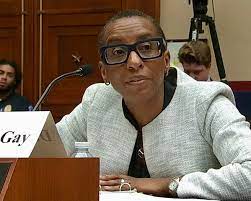
By Stacy M. Brown, NNPA
Harvard President Claudine Gay has resigned, making her tenure the shortest in the university’s history. The decision comes after just six months and two days in office, amidst mounting allegations of plagiarism and criticism over her handling of antisemitism issues on campus.
Harvard University spokesperson Jonathan L. Swain declined to comment on Gay’s decision, but Harvard’s official student newspaper confirmed the move.
The first Black president in the storied university’s nearly 400-year history, Gay faced scrutiny over various incidents, including the administration’s response to the October 7 Hamas attack and allegations of plagiarism in her scholarly work. The controversy escalated after her congressional testimony on December 5, where she faced criticism for evasive answers regarding antisemitism.
The Harvard Corporation had previously expressed unanimous support for Gay after “extensive deliberations” following the congressional hearing. However, the recent plagiarism allegations and ongoing controversies seemingly led to a change in circumstances, resulting in Gay’s resignation.
Just the second woman to lead Harvard, Gay expressed her decision in a letter to the Harvard community. “It is with a heavy heart but a deep love for Harvard that I write to share that I will be stepping down as president,” she stated.
Accusations of plagiarism surfaced in the past month, with a new and unsigned complaint published in The Washington Free Beacon adding to about 40 previous allegations. The complaint highlighted issues in Gay’s scholarly work, including her doctoral dissertation from 1997.
The controversy gained traction through conservative media, with accusations suggesting inadequate citation in approximately half of the 11 journal articles on her resume. The university acknowledged instances of insufficient citation but stopped short of labeling it “research misconduct.”


